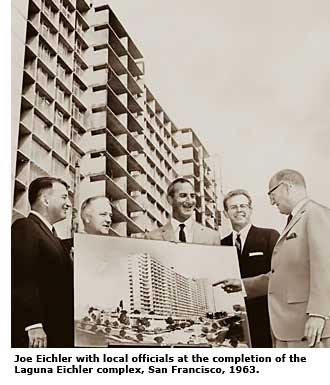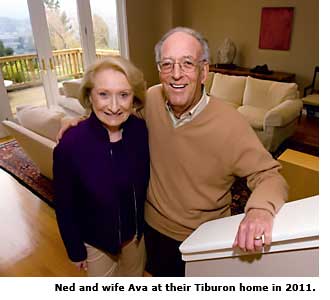Eichler vs. Eichler - Page 3
Joe said no. "I would have become very important in a general sense to the business. He couldn't have that," Ned said. "We had a terrific fight about it, a bigger fight than the other one—and I quit."
Ned, who was named chairman of the California Housing Commission in 1962, went to work for Victor Palmieri, a lawyer and developer, on projects in the Los Angeles area for a year in 1962 to 1963—until Ned got a call for his father. "I want you to come back. I can't do this without you," Joe told him.
"There was a side of me that wanted to hear this," Ned said, "and there was another side of me that was very skeptical."
Palmieri, who would play a large role in Ned's later career, suggested instead that Ned become a builder on his own. "Your father is never going to live up to this," Palmieri told him. "He means it now, but he can't."

But Joe's offer sounded good. "He said, 'I'll separate the two parts of the business. You run the single family, I'll run the high-rise." All went well for a few months—until Joe decided to step onto Ned's turf by building a small subdivision in Marin. "So," Ned said, "Victor was right." That was the end of Ned's tenure at Eichler Homes. From 1964 to 1966, Ned ran the New Communities project at UC Berkeley, a Ford Foundation study of 'new towns.' In 1966 he was a visiting professor at the university's business school.
After Joe suffered a heart attack that year, Ned stepped in, determined that Eichler Homes was essentially insolvent, and began negotiating with creditors—until his dad interfered after one creditor called him directly. "My father sent him several thousand dollars," Ned said, adding, "It completely undercut the negotiation."
The company was sold to a pair of investors, and was quickly forced into bankruptcy.
From 1968 to 1973, the years when Joe resurrected his career as a homebuilder by starting a new company, Ned developed apartment houses in Southern California for the Klingbeil Co. "I could almost make the statement that Eichler Homes going bankrupt liberated me," Ned said.
In 1974, the year his father died, Ned entered an entirely new business—the 'workout' field, so named because its practitioners help bankrupt companies work out their problems by arranging repayments and disposing of assets. As a principal with Victor Palmieri and Co., Ned handled some of the biggest workouts of all, including the bankruptcy of the Penn Central Railroad in New York (Ned disposed of the firm's immense real estate holdings in New York City), and the court-ordered divestiture of Levitt and Sons, the inventor of Levittown, by the conglomerate ITT.
Ned's experience with the failure of Eichler Homes served him well. "I was very good at being very clear at how to deal with deep financial trouble," he said. "Not many people are."
Ned was soon closing down Levitt operations in Detroit and Chicago, dealing with troubled homebuilding schemes near Paris and Madrid, walking away from every bad deal he could, and angering many people. "I found out I was really good at that. It's being an outsider. I was perfectly able to look at people and say, 'That's it.' Even if they yell, they put on a big performance."
"We took a company that had been losing $5 million a month," said Koskinen, who went on to become a politically influential lawyer, "and turned it into a profitable entity."
Although Ned, who was never as committed to modernism as his dad, didn't turn Levitt into a developer of modern tracts, in Puerto Rico he did produce homes with open-plan interiors and sliding glass that opened to rear yards. They were, he said, innovative for being the first tracts on the island for move-up buyers.

Once he eliminated Levitt's worst assets, Ned signed on as president of the restructured company—until he ran into an all-too familiar situation. The new owner, who had promised to give Ned free rein, was ordering him to build in Chicago—a market that Ned expected to tank.
"We had a terrific fight, terrific fight," Ned said. "He was screaming at me. Nobody talks to me like that. I walked out."
Ned's next business was the Eichler Corp., which he ran in the Bay Area from 1982 through 1995, providing mortgages to owners of large apartment buildings. He pioneered second mortgages for apartment owners, allowing them to free up capital for expansion.
Ned, who retired in 1995, lives with his wife, Ava, in a Tiburon home with a view of San Francisco Bay. The home is of no definable style. "Personally I'm kind of a minimalist in design," he said, "but I have no great personal affection for Eichler homes or modern architecture in general."




